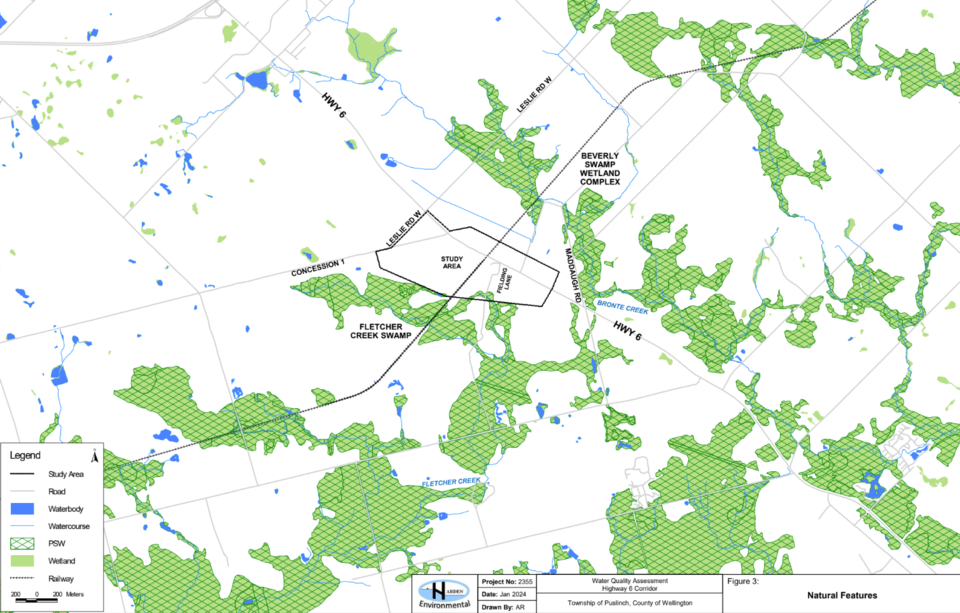PUSLINCH – Township environmental consultants believe the smelly water experienced by private well owners last summer was caused by a chemical spill along Highway 6.
Retained by Puslinch to investigate the rotten vegetable odour reported by several private well owners in July 2023, a new report from Harden Environmental Services Ltd. says the smell was caused by a "chemical spill of an unknown substance" or "unknown releases of similar materials" in a ditch along Highway 6 where a Ministry of Transportation (MTO) cleanup occurred.
While an earlier update from the MTO claimed a chemical spill was unlikely because it couldn't penetrate the bedrock due to the ground thickness where the water is drawn from, the new report said the bedrock aquifer's "interpreted overburdened geology" provides "a potential migration pathway" for surface contaminants to be drawn toward nearby pumping wells.
Dated January 2024, the Harden report says the MTO and their consultants originally interpreted the soil quality results as typical of roadside fill material despite "an unknown substance not typically associated with roadside fill" and not naturally occurring in groundwater within the study area being identified within the spill location sample.
The report said the MTO's spill investigation and cleanup occurred within an open roadside ditch on the east side of Highway 6 south of Leslie Road West and adjacent to a residential driveway.
The date the spills and cleanup occurred is unknown. Neither is what the material spilled was.
was.
No one has determined the water to be unsafe, but the township plans on seeking further testing.
In an emailed response, Puslinch interim CAO Courtenay Hoytfox said the township chose to investigate the source of the smelly water despite not having legislative responsibility because residents said the odour persisted after the conclusion of the initial investigation and council was concerned.
The township did not receive a spill confirmation from the MTO or MECP.
In addition to spending "significant time" searching for a laboratory capable of completing the additional tests, Hoytfox said it was "prudent" the township waited to review the information with the MECP "given their authority over such matters" and their involvement with the original complaints and investigation before releasing the report.
The township has invited affected residents to an informal meeting with Harden to discuss investigation findings, potential property implications and next steps.
Of the over 40 properties studied, Harden said at least 10 private well owners experienced the odours between mid-June and August 2023. At least one well owner was still experiencing odour issues in November 2023.
All the affected wells were within about 900 metres of the spill location and downstream from a location that receives groundwater.
Strong odours were also found in water from several bedrock wells downstream of the spill area between June and July 2023.
One affected property owner, Susan Fielding, said she felt blindsided when she was emailed the Harden report soon after Seeley announced earlier this week that the township might send the samples to California for further testing.
"This has caused a lot of issues," said Fielding, who hasn't drunk her tap water since the odour appeared. Instead, Fielding said she buys two cases of bottled water a week which she uses for everything from cooking to brushing her teeth.
"It used to be when my four little grandchildren came for a visit we'd have dinner, give the kids a bath and take them home and that doesn't happen anymore because we really don't know what's in the water," said Fielding.
Thanking the township for involving an outside consultant to further investigate the water issue, Fielding said she doesn't understand why they sat on the information when residents could've been taking additional precautions to safeguard themselves.
Detecting sulfur compounds "more than 100 times higher than the human olfactory detection level," Harden said the tested water samples contained compounds that occur in surface water features containing decomposing organic matter or are used in various industrial and commercial applications.
"Known to be toxic at high concentrations," Harden said the effects of low-level exposure to the identified odour-causing compounds are unknown and safe concentrations in drinking water haven't been established.
"(The dishonesty is) the part that I find very, very disappointing and quite frankly, I'm shocked," said Fielding. "To me, it's just common sense that if you know you have the information of how a person can protect themselves for a potentially bad outcome, you have a duty of care, in my opinion, to tell the person what you know."
In November 2023, the MTO told Harden the soil test results where the spill occurred were considered “acceptable, with only minor exceedances as would be typical of materials in a roadside ditch, exposed to asphalt fill materials and salt.”
The MTO also indicated that “no spill response work was completed as part of (the spill) investigation" and “the Ontario Spill Response Team wore (protective) suits as a precautionary measure," said the Harden report.
Temporarily and spatially limited to the time frame and area downstream of the identified spill, the water odour is not considered a widespread issue in the township or southern Ontario.
The MECP said “a properly maintained well along with an appropriate treatment technology," like granular activated carbon or reverse osmosis, can remove the odour-causing substances and make the water more palatable.
Residents are encouraged to follow Wellington-Dufferin-Guelph Public Health and the MECP's recommendations regarding well water treatment.
Isabel Buckmaster is the Local Journalism Initiative reporter for GuelphToday. LJI is a federally-funded program.



